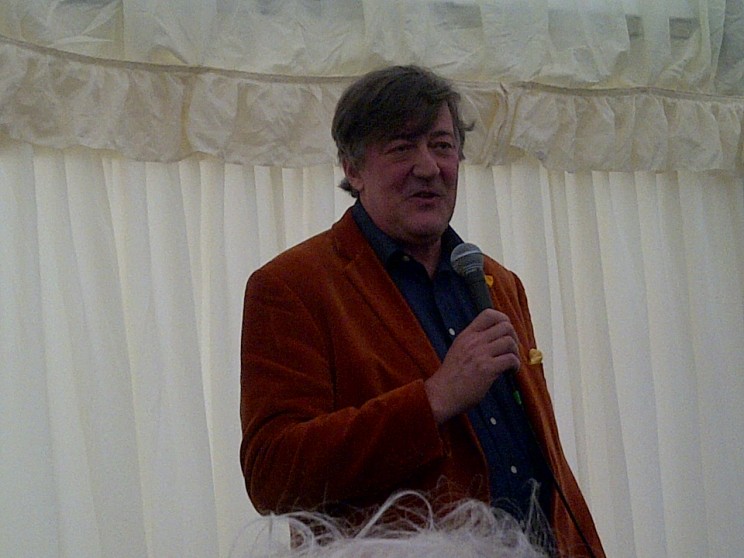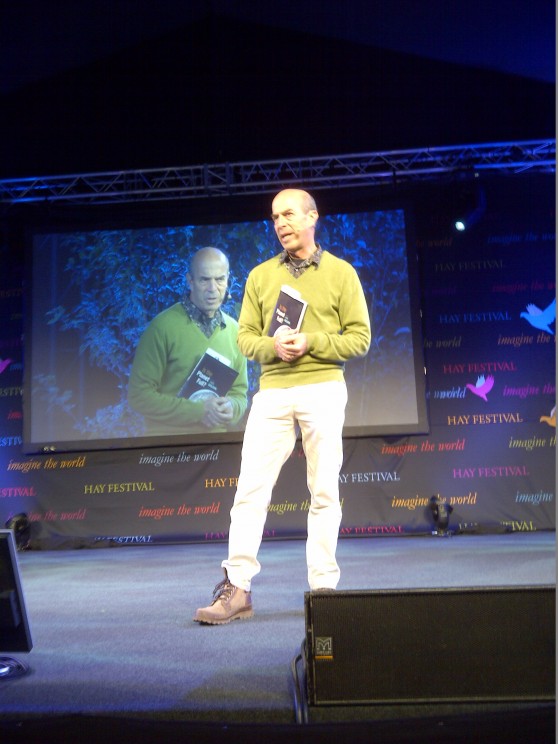By Kate Farquhar-Thomson
It was down to the trustworthy sat nav that I arrived safe and sound at Hay Festival this year; torrential downpours meant that navigating was tougher than usual and being told where to go, and when, was more than helpful.
Despite the wet and muddy conditions that met me at Hay, and stayed with me throughout the week, the enthusiasm of the crowd never dwindled. Nothing, it seems, keeps a book lover away from their passion to hear, meet, and have their book signed by their favourite author. But let’s not ignore the fact that festival-goers at Hay not only support their favourite authors, they also relish hearing and discovering new ones.

My working holiday centres on our very own creators of text, our very own exponents of knowledge, our very own Oxford authors! Here I will endeavour to distil just some of the events I was privileged to attend in the call of duty!
Peter Atkins was an Oxford Professor of Chemistry and fellow of Lincoln College, Oxford until his retirement in 2007 – many of us, including myself, studied his excellent text-books at ‘A’ level and at university. What Peter Atkins does so well is make science accessible for everyone and none less so than an attentive Hay audience. Peter puts chemistry right at the heart of science. ‘Chemistry has rendered a service to civilization’ Atkins says ‘it contributes to the cultural infrastructure of the world’. And thereon he took us through just nine things we needed to know to ‘get’ chemistry.

Ian Goldin’s event on Is The Planet Full? addressed global issues that are affecting, and will affect, our planet. So, is the planet full? Well, the Telegraph tent for his talk certainly was! Goldin, whose lime green sweater brought a welcome brightness to the stage, is Professor of Globalisation and Development and Director of the Oxford Martin School at the University of Oxford. His words brought clarity and insight: “politics shapes the answer to this question,” said Goldin.
Hay mixes the young with the old and academics with us mere mortals, and what we publishers call the ‘trade’ authors with the more ‘academic’ types. This was demonstrated aptly by Paul Cartledge who right from the start referenced an earlier talk he attended by James Holland. Cartledge is A.G. Leventis Professor of Greek Culture at University of Cambridge and James (who is an ex-colleague and friend) is a member of the British Commission for Military History and the Guild of Battlefield Guides but a non-academic. The joy of Hay is that it brings everyone together. Paul Cartledge was speaking about After Thermopylae, a mere 2,500 years ago, but rather a more tricky period to illustrate through props and pictures which Holland so aptly used in his presentation.

OUP had 15 authors at The Hay Festival but the Hay Festival also had other visitors such as Chris Evans whose show was broadcast live from the festival as it was the 500 Words competition announcement and I was lucky enough to be there.
So what does Hay mean to me? It’s a unique opportunity to get up close and personal with heroes in literature and culture, as well as academia. It’s a week of friends, colleagues, and drinking champagne with Stephen Fry whilst discussing tennis with John Bercow – and wearing wellies every day!
Kate Farquhar-Thomson is Head of Publicity at OUP in Oxford.
Subscribe to the OUPblog via email or RSS.
Image credits: Stephen Fry, Ian Goldin, and 500 Words competition at the Hay Festival. Photos by Kate Farquhar-Thomson: do not reproduce without permission.
The post Post-Hay Festival blues appeared first on OUPblog.

By Paul Cartledge
Let’s be clear of one thing right from the word go: this is not in any useful sense a historical movie. It references a couple of major historical events but is not interested in ‘getting them right’. It uses historical characters but abuses them for its own dramatic, largely techno-visual ends. It wilfully commits the grossest historical blunders. This is in fact a historical fantasy-fiction movie and should be viewed and judged only as such. But in case any classroom teachers of Classical civilization or Classical history should be tempted to use it as a teaching aid: caveant magistri — let the teachers beware! Here are just five ways in which the movie is at best un-historical, at worst anti-historical.
(1) Error sets in with the very title: the ’300′ bit is a nod to Zack Snyder’s infinitely more successful 2006 movie to which this is a kind of sequel, and there is not just allusion to but bodily lifting of a couple of scenes from the predecessor. But which Empire is supposed to be on the rise here? I suppose that it’s meant to be, distantly, the ‘Athenian Empire’, but that didn’t even begin to rise until at least two years after the events the movie focuses on: the sea-battles of Artemisium and Salamis that both took place in 480 BCE.

(2) The movie gets underway with a wondrously unhistorical javelin-throw — cast by Athenian hero Themistokles (note the pseudo-authentic spelling of his name with a Greek ‘k’) on the battlefield of Marathon near Athens in 490 BCE, a cast which kills none other than Persian Great King Darius I, next to whom is standing his son and future successor Xerxes. Actually, though Darius had indeed launched the Persian expedition that came to grief at Marathon, he was not himself present there, nor was Xerxes.
Themistocles, on the other hand, was indeed present, but rather than carrying and throwing a javelin he was fighting in a dense phalanx formation and wielding a long, heavy pike armed with a fearsome iron tip made for thrusting into the Persian enemy hand-to-hand.
(3) From the Persians’ Marathon defeat, which (historically) accounts for their return revenge expedition under Xerxes, the scene shifts to the Persians’ fleet — in fact, a whole decade later. Connoisseurs of 300 will have been prepared for the digitally-enhanced, multiply-pierced and bangled Rodrigo Santo reprising his role of ‘god-king’ Xerxes. (Actually Persian king-emperors were not regarded or worshipped as gods.) Even they, though, will not necessarily have expected the Persian fleet to be under the command of a woman, and a Greek woman at that: Queen Artemisia of Halicarnassus (modern Bodrum), who is represented (in the exceedingly fetching person of Eva Green) as the equal if not superior of Xerxes himself, with her own court of fawning and thuggish male attendants, all hunks of beefcake.
Here the filmmakers are indeed drawing on a properly historical well of evidence: Artemisia — so we learn from Herodotus, her contemporary, fellow-countryman, and historian of the Graeco-Persian Wars — was indeed a Greek queen, who did fight for Xerxes and the Persians at Salamis. She did allegedly earn high praise from Xerxes as well as from Herodotus for the ‘manly’ quality of her personal bravery and her sage tactical and strategic advice.
But she was far from being admiral-in-chief of the entire Persian navy. She contributed a mere handful of warships out of the total of 600 or so, and those ships of hers could have made no decisive difference to the outcome of Salamis one way or the other.
(4) For some reason — perhaps because they were conscious of the extreme sameness of most of their material, a relentless succession of ultra-gory, stylised slayings, to the accompaniment of equally relentless drum’n'bass background thrummings — the filmmakers of this movie, unlike of 300, have felt the desire or even the need to include one rather prolonged and really quite explicit heterosexual sex-encounter. Understandably, perhaps, this is not between say Themistokles and his wife (or a slave-girl), or between Xerxes and a member of his (in historical fact, extensive) harem.
But — utterly and completely fantastically — it is between Themistokles and Artemisia in the interim between the battles of Artemisium (presented as a Greek defeat; actually it was a draw) and Salamis. Cue the baring of Eva Green’s considerable pectoral assets, cue some exceptionally violent and degrading verbal sparring, and cue virtual rape — encouraged by Artemisia at the time but later thrown back by her in Themistocles’s face as having been inadequate on the virility front.

(5) The crowning, climactic historical absurdity, however, is not the deeply unpleasant coupling between Themistokles and Artemisia, but the notion that in order for Themistocles and his Athenians to defeat the Persian fleet at Salamis they absolutely required the critical assistance of the massive Spartan navy which — echoes here of the US cavalry in countless westerns — turned up just in the nick of time, commanded by another Greek woman and indeed queen, Gorgo (widow of Leonidas, the hero of 300), again played by Lena Headey.
Actually, Sparta contributed a mere 16 warships to the united Greek fleet of some 400 ships at Salamis, and like Artemisia’s they made absolutely no difference to the outcome, which was resoundingly and incontestably an Athenian victory. The truly Spartan contribution to the overall defeat of the Persian invasion was made in very different circumstances, on land and by the heavy-infantry Spartan hoplites, at the battle of Plataea in the following summer of 479. But that is quite another story, one in which the un- or anti-historical filmmakers show not even a particle or scintilla of interest.
Paul Cartledge is the A.G. Leventis Professor of Greek Culture at the University of Cambridge and the author of After Thermopylae: the Oath of Plataea and the End of the Graeco-Persian Wars (OUP, 2013). He hastens to make clear that he was not in any way a consultant on ’300: Rise of an Empire’, as he had been, in a minor way, on ’300′.
Subscribe to the OUPblog via email or RSS.
Subscribe to only classics and archaeology articles on the OUPblog via email or RSS.
Image credit: 300: Rise of An Empire. (c) Warner Bros. via 300themovie.com
The post Five things 300: Rise of an Empire gets wrong appeared first on OUPblog.








